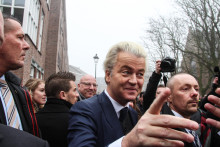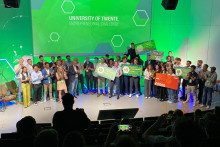Last night, the VVD faction in the House of Representatives approved the agreement for forming a new cabinet. Earlier, the factions of PVV, NSC and BBB had done the same. So now there’s an outline agreement.
Fewer study migrants
Fewer international students should come to the Netherlands, the four parties think. Over time, they want to save 293 million euros per year on higher education this way.
It mainly concerns a restriction of student migration in the Bachelor's degree programmes, 'excepting programmes where there are labour market shortages, taking into account local circumstances', the agreement reads.
This means the Master’s programmes will remain unaffected for the time being. This does raise the questions of who will determine the exceptions and what local circumstances can play a role. The parties are saying they want to conclude an administrative agreement.
They also want an enrolment limit for international students, a 'restriction on obtaining a basic student grant' for European students and an 'increase in tuition fees for non-EU students'.
Students
1.4 billion euros has been freed up for an extra compensation for students belonging to the bad luck generation. This will probably replace the lower interest rate on student debt that was mentioned earlier.
But students will also face considerable cuts. The penalty for slow students is making a comeback. Students will have to pay three thousand euros extra in tuition fees if they take longer than one year extra to finish their Bachelor's or Master's degree. Over time, this will bring in 280 million euros per year, the four parties estimate.
Austerity measures for student financing have also been announced. Students will no longer receive a public transport allowance if they go abroad to study. This applies both to exchange students and to students completing an entire programme abroad. This represents about 30 million euros per year.
Another resolution in the agreement: 'Continuation requirements will not be relaxed and the options for selective admission will remain unchanged.' So these things will stay the same.
Science
The axe will be taken to science. The four parties want to get rid of the funding (215 million euros per year) for the national sector plans, in which universities make joint agreements about their education and research.
The Fund for Research and Science will be cut by 1.1 billion euros in the years ahead. The National Growth Fund, which was to reinforce the knowledge economy, had already been shut down and this will remain the case: this means a cut of 6.8 billion euros in the next ten years.
Knowledge migration
It will also be less easy for foreign employees with specific knowledge to enter the country. 'The qualification requirements in the knowledge migration scheme will be tightened and increased.'
Language
Study-related migration will automatically become ‘more selective’, the parties think, once there are 'more degree programmes in Dutch'. This again raises the question of who’s in control: the programmes themselves or the minister?
Elsewhere, it says: 'Promoting Dutch language skills will once again become a core task of knowledge institutions in Higher Education. ‘Anglicisation’ will be reduced, with strategic exceptions for programmes for professions experiencing shortages.'
Knowledge security
Knowledge security is also covered. 'The Netherlands must not be naive when it comes to state actors that send people here or that control their espionage activities here', the parties think. 'Measures will be taken to protect our knowledge.'
'There will be a greater focus on tackling digital threats by state actors and cybercriminals', one of the points reads. 'Close collaboration between government, security services, science and business will be encouraged.'
System of funding
The funding of higher education will be slightly less dependent on the number of students. This is important for institutions facing a decline in the number of students, especially in areas where enrolment numbers are declining.
The ramifications depend on the implementation, but the agreement reads as follows: 'For the funding of higher education we will make a partial switch to capacity funding to keep afloat programmes that are facing declining student numbers but that are important for the labour market or the region.'
Teacher training for primary education (PABO)
To reduce teacher shortages in primary education, one of the things the four parties want to do is 'recruit more male teachers by introducing separate programmes geared towards younger and older children'.
The idea behind this is that men are less interested in doing an internship at a kindergarten and will be able to focus on older pupils in the future. The House of Representatives recently adopted a motion on this subject, to which outgoing Minister Robbert Dijkgraaf gave a critical response.
Where do we go from here?
Now the outline agreement is here, a prominent figure will be appointed to form the new government team. None of the four faction leaders will be a member of the
cabinet, the final report of the inquirers reads.
This means Geert Wilders will not become prime minister. Over the past few days, Ronald Plasterk’s name has been making the rounds. He’s a former Minister of Education and Internal Affairs, who at one time aspired to be the leader of PvdA.
Plasterk is a biologist and former winner of the Spinoza Prize, the Netherlands’ most prestigious scientific award. Recent news reports say he made a lot of money with a patent to which someone else may be entitled.
He became an inquirer in December, after PVV Senator Gom van Strien had resigned his duties following formal allegations of fraud against him by his former employer, a Utrecht University affiliate.







